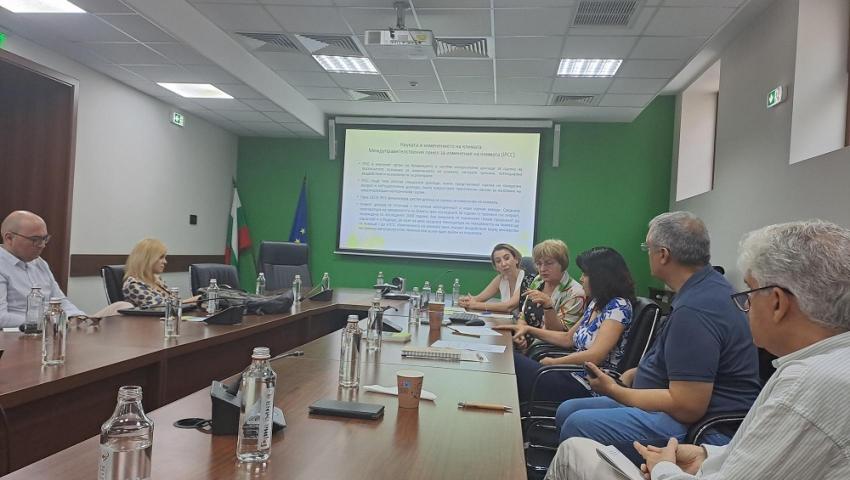Bulgaria with a new proposal for the countries of Southeast Europe to jointly organize the largest climate forum COP29 next year

A seminar for journalists was held at the Ministry of Environment and Water on how policies are formed at the international, European and national level.
Photo: Raya Lecheva
Raya Lecheva
Bulgaria is proposing that the countries of South-Eastern Europe organize COP29 next year, each of which can take on a different thematic area of the world's largest climate forum and one of the largest international events in the world, which is annually visited by over 30,000 people. This was announced by Boryana Kamenova, director of the "Amendment Policy" directorate of the climate" in the Ministry of Environment and Waters today at a seminar on the international, European and national level policies on climate change, organized by the MoEW.
At the seminar, the Minister of Environment and Water, Julian Popov, developed his proposal, which is related to talks with the UN Secretariat, which is located in Bonn, with the idea being to hold the negotiations between the negotiating teams and the meetings of the officials in Bonn, Germany, and the parties from Southeast Europe to organize thematic sessions. The proposal is under discussion because, in general, Germany does not want to block its economy and is worried about such a large flow of people in one place. However, the countries of Southeast Europe agree to participate in a similar format. A final decision on which country will be the next president of the COP is expected to be taken at the latest during the COP28 meeting in Dubai by December 12, explained Silvia Rangelova, Director of the Directorate "Coordination of EU Affairs and International Cooperation" at the MoEW.
The election of the country chairman is carried out on a rotating basis and next year it must be taken from the group of countries from the former Soviet bloc (Eastern bloc), which also includes Bulgaria. However, Russia has said it is blocking any EU country from hosting. A few days ago, Belarus also stated in a letter to the Ministry of Environment and Water that it would also block the Bulgarian candidacy. Other candidates are Armenia and Azerbaijan, but because of the conflict between them, they are blocking each other, which also makes it unlikely that one of these countries will take the presidency of the next climate meeting. Moreover, even in the unlikely event that Azerbaijan would take on this responsibility, it would raise a very serious question as to why, after Egypt, Dubai, once again a country with large oil reserves and powerful oil and gas companies, would take the leadership of an international climate forum. The presidency is then taken over by the BRICS group of countries, with Brazil as the most likely candidate. If there is no consensus and the choice of a country from the former Soviet bloc, for the second year in a row the presidency of the COP will be led by Dubai. This places an extremely large image burden on the world's climate opponents and is an expression of dissatisfaction from a large part of the non-governmental sector around the world.
Rangelova added that by October 16, the Council of Ministers will make final decisions on the positions it will defend at the upcoming climate meeting in Dubai, which will be held from November 30 to December 12 in Dubai.
The aim of the European Union is that all countries at world level are involved in climate change policies. After the Kyoto Protocol, the Paris Agreement of 2005 is the new global memorandum to reduce harmful greenhouse gases. However, it provides for voluntary commitments to reduce emissions. Unfortunately, the European Union may be a leader in making policies, but it is not among the leading emitters, emitting only 8% of harmful greenhouse gases, the leaders are the USA, China, India, Brazil, Russia. The EU plans €100 billion in aid for developing countries that are most vulnerable to climate change, threatened by storms, floods and extinction, such as small island states, and need investment to adapt to climate change. One of the main debates will be to achieve greater commitment from all countries, including the so-called developing countries, which include Dubai, UAE, Brazil. On the international scene, another very important question is raised, how the countries of the developing countries spend the funds of the developing countries, and it is extremely important, especially for the EU countries. International agreements, however, do not have a sanctioning mechanism, nor do they have control mechanisms, and at the same time, the EU's policy in this regard and in relation to the policies of the European Green Deal is very strict.
All EU countries have committed to reducing emissions by at least 55% by 2030 compared to 2005 and achieving climate neutrality by 2050. They are voluntary in nature. Another issue is that Bulgaria has currently approved a voluntary 40% emission reduction by 2026 versus 2019, the discussion topic under the Recovery and Resilience Plan. However, according to experts, this happened without an impact assessment. In reality, the new EU goal of climate neutrality by 2050 also lacks an assessment of the impact on all sectors, the economy and people's lives. The EU's arguments are that if the countries have already reached a 40% reduction, even some have exceeded the targets, then we will be able to reach a 55% reduction by 2030. The question is whether Bulgaria will be able to achieve a reduction by 2026 compared to 2019, which according to some experts we have achieved. But it is clear that we are the first country to have made such a voluntary commitment to deliver on the already clear goal of a 55% reduction in emissions by 2030.
